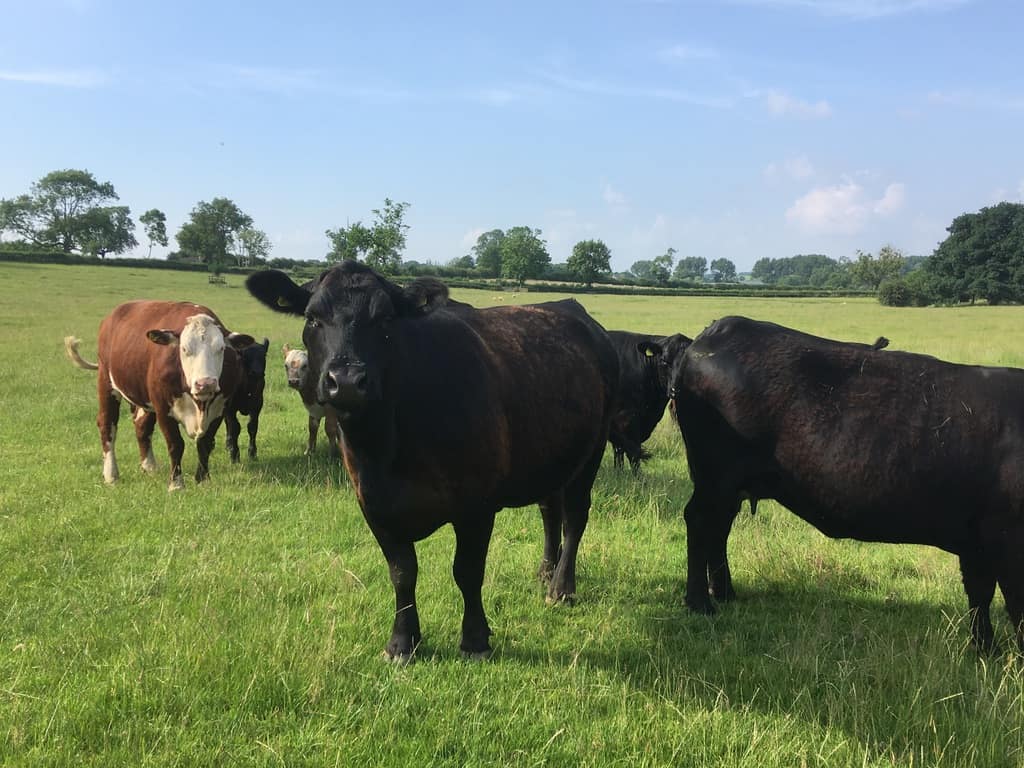
Hylton Murray-Philipson from Blaston Farm near Market Harborough is very concerned. “UK farming is under threat from climate change and from Brexit. This decade will be make or break for the future of human life on earth. Our time is running out and we have to stop talking about it and get on with it,” he told our client audience at the Creating The Future (CTF) event. “If managed correctly, soil can store more carbon than the rainforests and the atmosphere combined”.
Before World War II, fields in the Welland Valley around Market Harborough had been entirely grassland, but the postwar drive for efficiency coupled with EU subsidy regimes had led to decades of intensive farming. Eventually, in common with many farmlands across the UK, this led to the depletion of organic matter and increasing dependence on artificial inputs. Hylton openly admitted that he had been guilty of ignoring the quality of his farm’s soil until he noticed the detrimental impact of continuous arable cropping. The farm began to suffer from infestations of black grass, which thrives on poor compacted soils, and which was becoming immune to chemical applications. “In addition” said Hylton, “we began to experience soil erosion, with topsoil literally going down the river,” says Hylton. “That is insane for me, and for society at large, as soil is the most valuable thing we have to leave to the next generation.”
Enhancing sustainability, diversifying income
Set against a challenging backdrop for conventional farming – monoculture cropping, plateauing yields, an over-reliance on artificial fertilisers and the loss of EU financial support – Blaston has been looking to enhance its sustainability, while at the same time creating more diverse revenue streams.
In recent years, the farm has looked to bring its soil back to life by adopting regenerative farming techniques. These include minimal soil disturbance (all crops are now directly drilled), cover crops (which protect the soil and help the build-up of organic matter) and diverse crop rotations alongside livestock grazing. As part of its commitment to permanence, the farm has entered into legal agreements that prevent it from ploughing for 10 years.
Worms have returned
“Brexit forced me to reconsider every aspect of my farming operation, because if you want to be green you have to be in the black,” Hylton says. “Today, my farm is taking carbon dioxide out of the atmosphere and putting it back into the soil – and getting paid to do so.”
The difference in the quality of the soil is already measurable. “When I used to put a spade in the ground, it was lifeless and smelt awful. Two years later, worms have returned. Our worm count has gone from about 7 per square metre to over 50. This indicates that if you respect natural processes, you can put things back,” he adds. “ And if the worms are happy, the farmland birds are going to be happy too.”
A farming first for carbon certificates
Blaston Farm’s strategy is paying dividends – both from a sustainability and a financial perspective. Having undertaken independent soil measurements with Ecometric, the farm can demonstrate it is now a net sequesterer of carbon – and it has become the first to generate carbon certificates based on high-density direct soil sampling. The value of the certificates, coupled with Defra’s £40 per hectare payment under the Sustainable Farming Incentive (SFI) scheme, will enable it to be financially and environmentally sustainable going forward.
Impact-driven carbon finance company Respira has committed to purchasing all of Blaston Farm’s carbon certificates for the current and upcoming production cycles. In turn, Respira has sold the certificates on the voluntary carbon market, offering the potential for companies to compensate for their own ongoing emissions by funding domestic carbon sequestration and improving the sustainability credentials of UK farming.
Hylton says: “I received a cheque last year that was greater than my payment from Brussels. And carbon has become my second highest source of income after wheat. We’ve been selling certificates to companies who are interested in being part of this really important, really exciting journey.”
Weatherbys supports Blaston and reduces its carbon footprint
Weatherbys Private Bank and its wider group of companies is continually seeking to reduce its environmental impact. Not only have we committed to becoming net zero, but as trusted advisers to our clients, we also want to stimulate discussion about the key issues that will affect them and future generations of their families.
As part of this commitment, we recently agreed to purchase 500 tonnes of carbon from Blaston Farm. In part, this will help finance the farm’s long-term goal of becoming more sustainable, while it could provide the catalyst for other farmers to follow suit by adopting regenerative agricultural techniques.
We are delighted to be supporting this pioneering yet equally important initiative. Without soil, there is no farming – improving its quality and biodiversity is crucial. Soil degradation, water quality and biodiversity loss pose a significant risk to food security and cost the UK about £1.2 billion every year.1 We need nature-based solutions, which include better land management practices such as soil carbon gains, to provide 30 per cent of the mitigation required by 2030 to keep our global climate goals within reach.2
There are high hopes that the Blaston Farm project will encourage farmers up and down the country to adopt regenerative practices to restore life to soil and make a decisive contribution to achieving net zero. Hylton says it is “a win-win transaction” because it is good for the soil, good for biodiversity and good for the planet.
We could not agree more. We believe that for sustainability initiatives to succeed they must make sense financially as well as environmentally. This project satisfies both those criteria and supports our mission of stimulating discussion about important issues that will affect future generations.
